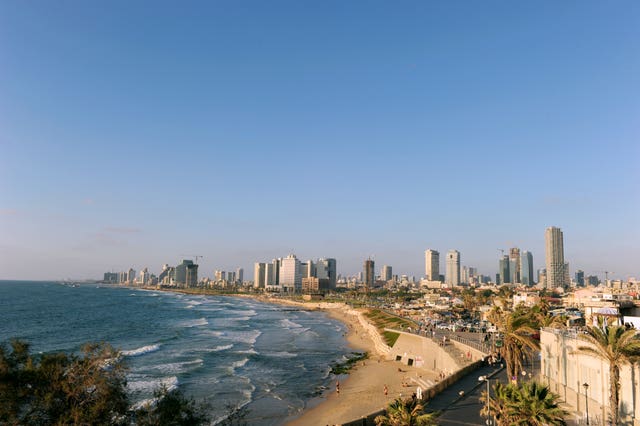Israel gives green light for return of UK holidaymakers
Groups of foreign tourists who have had both doses of a coronavirus vaccine will be allowed to enter from May 23.

Israel is to welcome the return of vaccinated UK holidaymakers from next month.
The Middle Eastern country announced it will reopen its borders to groups of foreign tourists who have had both doses of a coronavirus vaccine from May 23.
That is just six days after foreign leisure travel could be permitted to resume under Boris Johnson’s plan for easing lockdown restrictions.
Israel said inbound travellers will be required to take a PCR test before boarding their flight, and a serological test upon arrival to prove their vaccination status.
Full details will be released in the coming days.
The number of visitors allowed will initially be restricted but will increase “based on the health situation”, the government announced.
Individual travellers will be welcomed at a later stage.
There is speculation that Israel will be on the UK Government’s “green” list when it unveils details of its traffic light system for international travel.

This is partly due to 62% of Israel’s population receiving at least one dose of a coronavirus vaccine, which is among the highest proportion in the world.
If Israel is on the “green” list, UK holidaymakers would not need to self-isolate on their return, meaning it could be a popular summer destination.
Minister of health Yuli Edelstein said: “After opening the economy, it is time to allow tourism in a careful and calculated manner.
“Opening the tourism is important for one of the fields most hurt during the Covid year.”
Other countries that have said they will reopen their borders for UK visitors in the coming months include Cyprus, Greece, Malta and Turkey.

Meanwhile, a major coronavirus testing firm announced it will offer cut-price PCR tests for travellers returning to the UK.
Randox will charge customers flying with partner airlines £60 for the tests, which typically cost around £120.
The partner airlines have not been identified, but the PA news agency understands they will be major carriers and the discount will be available ahead of the summer.
Eurofins Covid Testing Services Ltd also announced it would be selling at-home PCR tests for £44.90 to “support the airline, travel and tourism industries and facilitate travel for all by removing the barrier of expensive testing”.
Last week’s UK Government announcement that travellers returning from even “green” destinations will be required to take PCR tests was met with an angry response from the travel industry.
Many firms wanted people arriving from low-risk countries to be able to take rapid lateral flow device tests, which are significantly cheaper and give results in 30 minutes or less.
PCR tests require swabs being processed in a laboratory, which can take several days and add to the expense.
Paul Charles, chief executive of travel consultancy the PC Agency, said reducing the price of testing is “the magic wand to recovery in the travel sector”.
Rory Boland, editor of consumer magazine Which? Travel, said: “While it is of course good news to see a test provider reduce its costs, it’s unhelpful that this comes with strings attached in that passengers may have to book with certain airlines.
“The Government should look at ways it can work with test providers to reduce the cost of mandatory testing, as many other countries have, to ensure that when international travel resumes, it is safe and affordable for all.”
David Evans, joint chief executive of testing firm Collinson, urged ministers to consider “all measures” to bring costs down, including “removing VAT across the testing supply chain”.





